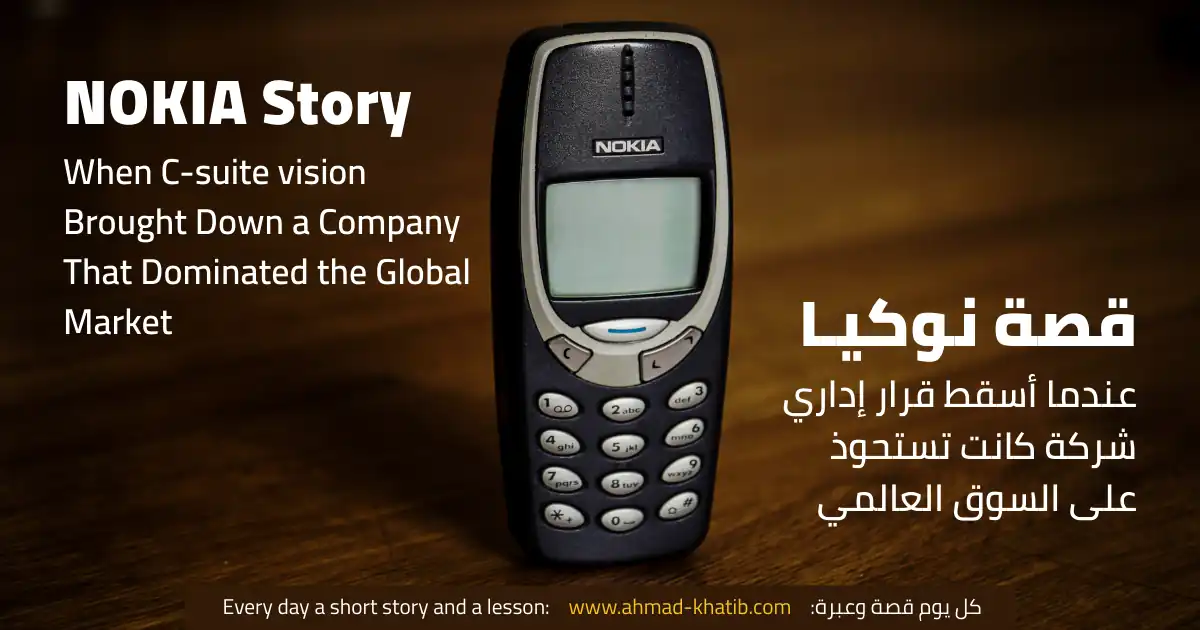قصة 'نوكيـا' عندما أسقطت ثقافة إدارية شركة كانت تستحوذ على السوق العالمي 2007 - قصة وعبرة
فقدت نوكيا جزءًا ضخمًا من حصتها السوقية خلال ثلاث سنوات فقط! وتراجعت قيمتها السوقية بشكل مهول! حتى انتهى بها المطاف ببيع قسم الهواتف لمايكروسوفت عام 2013...
كيف بدأت القصة؟
في بداية العقد الأول من الألفية، كانت نوكيا العملاقة تسيطر على أكثر من 40٪ من سوق الهواتف العالمي… وكانت المجلات التقنية تعنون “من يستطيع اللحاق بعملاق الهواتف المحمولة نوكيا”، رقم لم تصل إليه أي شركة من شركات الهواتف الذكية اليوم. حتى ظهر iPhone في عام 2007! فتغيّرت قواعد اللعبة…
كيف تعاملت نوكيا مع ظهور أيفون
المفاجأة ليست في التقنية… بل في الإدارة. حيث كشفت تقارير داخلية من مديري نوكيا بعد سقوطها عن سبب صادم: خشيت الفِرق مصارحة الإدارة! عرف المهندسون أن نظام تشغيل نوكيا “Symbian” لم يعد قادرًا على منافسة iOS أو Android… ولكن ثقافة الادارة كانت “نريد سماع الإنجازات فقط”، إدارة ترفض سماع الأخبار السيئة، وتضغط لتقديم نتائج سريعة وطرح منتجات جديدة في السوق، دون سماع جذور المشكلة لمعالجتها. باختصار، سادت ثقافة الخوف من ردود الفعل السلبية من الإدارة.
النتيجة؟
فقدت نوكيا جزءًا ضخمًا من حصتها السوقية خلال ثلاث سنوات فقط! وتراجعت قيمتها السوقية بشكل مهول! حتى انتهى بها المطاف ببيع قسم الهواتف لمايكروسوفت عام 2013، لتكب نهاية إحدى أقوى العلامات التجارية NOKIA التي سيطرت على جيل كامل من الاجهزة المحمولة.
🔍 الدروس المستفادة
لم تكن المشكلة تقنية فحسب… بل كانت مشكلة قيادة وثقافة مؤسسية. قال المدير التنفيذي ستيفن إيلوب stephen elop في خطابه الشهير للموظفين: “لم نفعل شيئًا خاطئًا… لكن بطريقة ما، خسرنا.” جملة مؤلمة… لأن المشكلة لم تكن في عدم العمل، بل في عدم سماع الحقيقة. ولكن ستيفن لم يتعترف في جملته هذه بالخطأ الكبير في ثقافته المؤسسية. ففي عالم الأعمال، حينما تغيب الصراحة داخل المؤسسة، تصبح أخطر عليها من المنافسة الخارجية نفسها، كما حصل في نوكيا. وفي بيئة العمل السامة هذه، لا تشعر الفِرق بالأمان لقول الحقيقة… فتصنع القرارات الخاطئة، وتُخفى المشاكل، ويتم الهروب إلى الأمام بانتجاه الانهيار ثم الزوال!!! ختاماً، الثقافة المؤسسية القوية لا تُقاس بسرعة الإنجاز فحسب… بل في اعداد بيئة تتيح لفرق الابداع قول الحقيقة بشفافية، ودون خوف من الإدارة، لتفادي الانهيار الكبير…
📖 The Nokia Story – When Corporate Culture Toppled a Global Giant The Beginning
How Did the Story Begin?
At the dawn of the new millennium, Nokia was the undisputed titan of mobile phones, commanding over 40% of the global market. Tech magazines ran headlines such as “Who can catch the mobile giant Nokia?”—a market share no smartphone company has reached since.Then came the iPhone in 2007, and the rules of the game changed...
How Did Nokia Respond to the iPhone?
The surprise was not in technology—it was in management. Internal reports from Nokia executives after the company’s decline revealed a shocking truth:Teams were afraid to tell the leadership the hard facts. Engineers knew that Nokia’s Symbian operating system could no longer compete with iOS or Android. Yet the prevailing management culture was: “We only want to hear achievements.” Leadership refused to acknowledge bad news, pressured teams for quick results, and pushed new products to market without addressing the root problems.
In short, a culture of fear silenced the truth.
The Result?
Within just three years, Nokia lost a massive share of its market. Its valuation plummeted. By 2013, the company gave up its mobile division to Microsoft—marking the end of one of the most powerful brands that had defined an entire generation of mobile devices.🔍 Lessons Learned
The downfall was not purely technological—it was a failure of leadership and corporate culture.In his famous memo, CEO Stephen Elop told employees: “We didn’t do anything wrong… but somehow, we lost.”
A painful statement—because the issue was not inactivity, but the refusal to face reality. Yet Elop’s words overlooked the deeper failure: a toxic culture that prevented honesty.
In business, when transparency disappears inside an organization, it becomes more dangerous than external competition. In such environments, teams no longer feel safe to speak the truth. Problems are hidden, wrong decisions are made, and the company marches forward blindly—towards collapse.
The Takeaway A strong corporate culture is not measured by speed of execution alone. It is defined by creating an environment where creative teams can speak the truth openly, without fear of management. That's how organizations avoid the kind of downfall that consumed Nokia.
